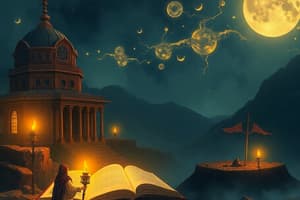Podcast
Questions and Answers
Divan edebiyatında en belirgin temalar nelerdir?
Divan edebiyatında en belirgin temalar nelerdir?
- Savaş ve Zafer
- Aşk ve Eros (correct)
- Bilim ve Teknoloji
- Doğa ve Manzara
Divan edebiyatının etkileri neler olmuştur?
Divan edebiyatının etkileri neler olmuştur?
- Bilim ve felsefe alanlarında büyük ilerlemelere sebep olmuştur.
- Osmanlı, Babür ve Fars şiirinin gelişimine yol açmıştır. (correct)
- Avrupa edebiyatında etkisini göstermiştir.
- Dini metinlerin yorumlanmasını etkilemiştir.
Divan şairleri genellikle ne tür konularla ilgilenmiştir?
Divan şairleri genellikle ne tür konularla ilgilenmiştir?
- Tarım ve Hayvancılık
- Politika ve Diplomasi
- Matematik ve Fizik
- Toplumsal sorunlar ve eleştiri (correct)
'Mathnawi' eseri hangi Divan şairine aittir?
'Mathnawi' eseri hangi Divan şairine aittir?
Divan edebiyatındaki şairler hangi dilin inceliklerini keşfetmişlerdir?
Divan edebiyatındaki şairler hangi dilin inceliklerini keşfetmişlerdir?
Divan edebiyatının mirası hangi edebi geleneğini etkilemiştir?
Divan edebiyatının mirası hangi edebi geleneğini etkilemiştir?
Divan edebiyatında Amir Khusrow'u öne çıkaran özellik hangisidir?
Divan edebiyatında Amir Khusrow'u öne çıkaran özellik hangisidir?
Divan şairlerinden Hafız'ın eserlerinde hangi tür konulara rastlanmaz?
Divan şairlerinden Hafız'ın eserlerinde hangi tür konulara rastlanmaz?
Jami'nin Divan şiirleri hangi özellikle dikkat çeker?
Jami'nin Divan şiirleri hangi özellikle dikkat çeker?
Yunus Emre'nin Divan edebiyatına katkısı nedir?
Yunus Emre'nin Divan edebiyatına katkısı nedir?
'Divan edebiyatı' terimi aşağıdakilerden hangisi ile ilişkilidir?
'Divan edebiyatı' terimi aşağıdakilerden hangisi ile ilişkilidir?
Divan edebiyatının temel özellikleri arasında aşağıdakilerden hangisi yer almaz?
Divan edebiyatının temel özellikleri arasında aşağıdakilerden hangisi yer almaz?
Study Notes
Divan Literature: A Poetic Journey Through Time
Divan literature, originating in the Persian-speaking worlds of the 13th and 14th centuries, is a rich and complex genre characterized by poetic dialogues and debates. This form of poetry emerged from the cultural melting pot of the Islamic Golden Age, blending together influences from Persian, Arabic, and Turkic traditions. In this article, we'll delve into the poets of the Divan era and the themes this literature explores.
The Poets of Divan Literature
Amir Khusrow (1253-1325 CE) is often considered the quintessential Divan poet. Born in India, he was a polymath who excelled in both Persian and Hindu literary traditions. His Divan is a treasure trove of mystical, philosophical, and linguistic verses.
Hafiz (c. 1315-1389 CE) is another iconic figure of Divan poetry. Hailing from Shiraz, Iran, Hafiz is renowned for his lyrical, enigmatic verses. His work is filled with religious allegories, love tales, and philosophical contemplations.
Jami (1414-1492 CE), a Persian poet and scholar from Afghanistan, is famous for his extensive Divan collection. Jami's poetry is known for its intricate language and intellectual depth.
Yunus Emre (d. 1320/1321 CE) was an Anatolian poet who wrote in Turkish, making a notable contribution to Divan literature by introducing Ottoman Turkish as a language of poetry. Yunus Emre's work is known for its simplicity, sincerity, and profound spirituality.
Mawlānā Jalāl al-Dīn Rūmī (1207-1273 CE) is arguably the most famous and influential poet of the Divan era. Born in Balkh, Afghanistan, Rumi was a Sufi mystic who penned the renowned Mathnawi, a collection of couplets that blends Sufi wisdom with humor, folklore, and spiritual insight.
Themes in Divan Literature
Divan literature is a rich tapestry of themes that reflect the intellectual and spiritual climate of the era. Some of the most significant motifs include:
Love and Eros
Divan poetry is replete with love stories and the complexities of relationships. The poets often explore the human condition through the lens of love, addressing themes of passion, yearning, and heartache.
Mysticism and Sufism
Many Divan poets were deeply embedded in Sufi traditions, which emphasize the pursuit of spiritual truth, love for God, and the development of mystical insight. The poets often combine philosophical and mystical ideas with the poetic form of Divan.
Critique of Society and Intellectual Debate
Divan literature frequently engages with contemporary issues and societal challenges, providing a forum for intellectual debate and criticism. The poets often use their verses to critique the ruling classes, question established norms, and propose alternative perspectives.
Language and Poetic Form
The Divan period saw the rise of complex and innovative poetic forms, such as the ghazal, ruba'i, and qasida. The poets of the time were also known for their mastery of language, exploring the nuances of Persian, Arabic, and Turkic vocabularies to create profound and enigmatic works.
Influence and Legacy
Divan literature had a profound influence on the literary traditions of the Islamic world and beyond. The poets of the Divan era set the stage for the development of Ottoman, Mughal, and Persian poetry, among others, and their works continue to be studied and admired by scholars and poetry aficionados alike.
In conclusion, Divan literature is a rich and complex genre that serves as a testament to the intellectual and spiritual climate of the Islamic Golden Age. The poets who emerged from this era painted a vivid portrait of their world, addressing themes of love, mysticism, societal critique, and poetic form. Their works continue to inspire and delight readers, providing a window into the rich tapestry of human experience.
Studying That Suits You
Use AI to generate personalized quizzes and flashcards to suit your learning preferences.
Description
Test your knowledge on the poets of Divan literature and the themes explored in this rich genre originating from the Islamic Golden Age. Explore iconic figures like Rumi, Hafiz, and Jami, along with the motifs of love, mysticism, societal critique, and poetic form prevalent in Divan literature.




